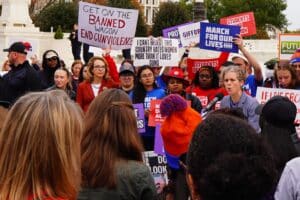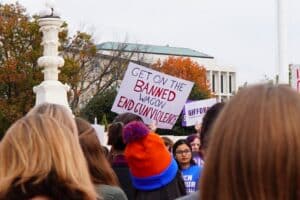The parents of an Aurora theater shooting victim felt revictimized after losing a “meritless” case against gun companies, but the gun-control group that backed them is most to blame.
Sandy and Lonnie Phillips, whose daughter Jessica Ghawi was killed in the attack, filed suit in 2014 against the companies from which the shooter bought his ammunition and magazines. Brady United described the case as their own in press releases and provided pro-bono representation for the Phillips. But only Sandy and Lonnie were listed as plaintiffs.
So, when they inevitably lost the case, only the couple was legally on the hook to pay for the defendants’ legal fees. The settlement reached into the hundreds of thousands and bankrupted the couple. Now, they have told a Colorado newspaper they felt Brady didn’t
“We lost three years of our life,” Lonnie Phillips told The Colorado Sun on Tuesday.
Mike Stankiewicz, a Brady spokesperson, repeatedly told The Reload that the group made the Phillips aware of the risks.
“Brady always informs our clients of the financial risks involved in the cases they file, especially when filing in a state like Colorado that has a gun industry special protection law that requires victims who bring about these lawsuits to pay for attorney and other fees when unsuccessful,” Stankiewicz told The Reload. “That was done in this case and in every single other case Brady has litigated on behalf of gun violence victims.”
It’s impossible to know exactly who is telling the truth from the outside. It seems unlikely that the Phillips, who are still advocating for the ability to hold gun companies liable for crimes committed by third parties, are lying about feeling misled. It’s entirely possible that Brady told the couple that losing the case and having to pay legal fees could happen but failed to emphasize just how incredibly likely that was to happen.
But that’s a huge ethical problem in and of itself.
Nobody should have been surprised by the outcome of that case. The fact the couple was caught off guard by their loss or the amount they were liable for is a clear failure on the part of the Brady lawyers who advised them.
This was a symbolic suit with no chance to win and little to no chance it wouldn’t end with a hefty bill for the plaintiffs. The federal Protection of Lawful Commerce in Arms Act (PLCAA) effectively forecloses cases against gun companies over claims they are liable for the criminal acts of third parties. And Colorado law makes it even more likely that plaintiffs will have to cover defendants’ legal costs in such cases.
This legal strategy has been employed by gun-control activists since the 1990s and never won on the merits. It has generated one significant settlement when the insurers of the defunct Remington Arms Corporation agreed to pay families of Sandy Hook victims to end their lawsuit against the company. But even the Conneticuit Supreme Court justices that allowed that case to proceed on its claim, without evidence, about the company’s advertising affecting the shooter said it would be difficult for plaintiffs to win on the merits.
But this case, like most cases seeking to hold gun companies liable for crimes they had no role in committing, wasn’t designed to win. The plaintiffs didn’t offer up any evidence the ammo dealers they sued knew anything about the shooter’s intentions. Nor did they make any specific arguments about how they could have known.
As Federal District Judge Richard P. Matsch put it, the suit was an “all conceivable claims attack on these internet sellers, attempting to destroy their legitimate businesses and invalidate the federal and state statutes protecting them.”
In reality, this case was designed to generate favorable headlines and political pressure. And, frankly, it worked.
MSNBC commentator Rachel Maddow featured the ruling in one of her “outrage-o-meter” segments at the time. Her take mirrored Brady’s own conclusion.
“[T]hey are going to be the first family ever ordered to pay the legal fees under that Colorado statute to the gun industry because they had a daughter who died in one of the worst mass shootings in the history of this country, in the state of Colorado, and they decided to say something about it,” she said.
The fact that Brady declined to help the Phillips cover the cost of the settlement the group helped thrust them into, allegedly because it couldn’t afford to do so, did not make the segment. That matched the general tone of major media coverage of the case.
The recent news that Brady left the Phillips on the hook for the full settlement cost has not generated nearly as much media attention. Even The Colorado Sun, which broke the news, buried it far down in their story. That’s because the Sun’s story focused on the other reason this tactic worked: Colorado is likely to repeal its fee-shifting law.
Now, that’s mainly because Colorado has slowly shifted toward a deeper shade of blue since the case ended back in 2015. Democrats are much more inclined to pass laws intended to help gun-control groups skirt the PLCAA, especially since the Remington settlement. But the Phillips being bankrupted as a result of their Brady-backed symbolic suit undoubtedly had an effect on bringing it up.
That’s not out of the ordinary for political lawsuits, though. Most high-profile political cases aren’t organic creations. They are planned as ways to challenge laws the activists involved don’t like.
That these kinds of liability suits often appear to be designed to burn gun company resources and time rather than winning on the merits of the claim is a significant problem. But the fact that this case was seemingly designed to lose and bankrupt the Phillips without their complete understanding is an even bigger one.
If activists are ok with being forced into bankruptcy by knowingly bringing a protest case they can’t win in order to generate positive news coverage and pressure on legislators, that’s one thing. If they are encouraged into that position without fully understanding the consequences, that’s much worse.







2 Responses
I’m of the belief Brady flushed the Phillips down the drain, Brady got what they wanted at little or no cost compared to the press they received. The Phillips were sacrificial pawns from the start. The Phillips are bankrupt but don’t forget the defendants are left with hefty legal fees too, a win win for Brady. Almost sounds like it was planned. No matter who wins the case Brady comes out on top, a strategy perhaps?
@Kenneth. “So, when they inevitably lost the case, only the couple was legally on the hook to pay for the defendants’ legal fees.” The Phillips are on the hook for the defendants legal fees so, technically, there is no “damage” to the defendant. That said, you are correct, Brady got exactly what they wanted, free publicity. Unfortunately, the Phillips were but pawns in Brady’s larger chess game.